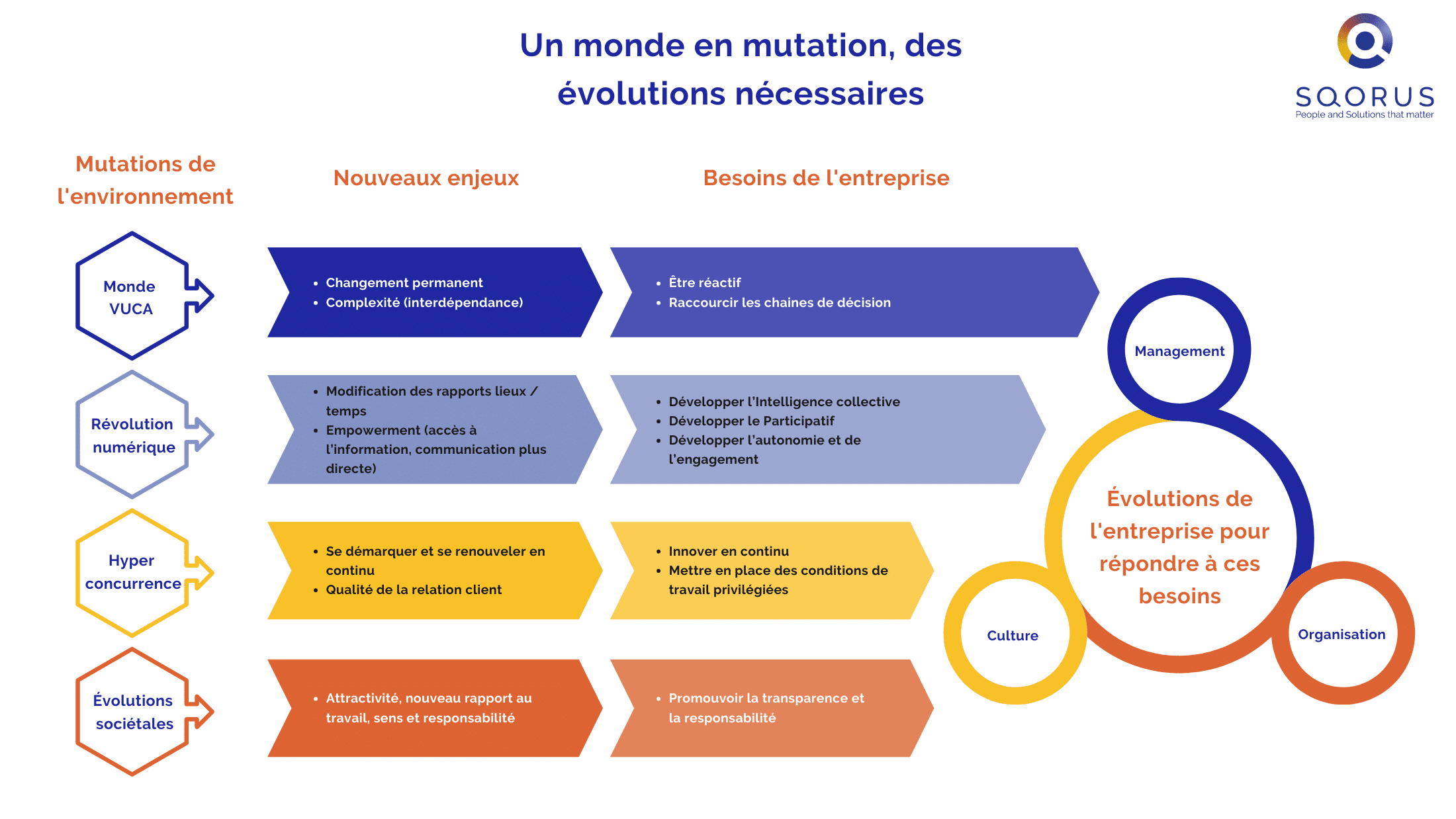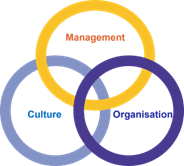Managerial innovation doesn’t simply satisfy a desire for novelty, it represents a profound adaptation to the new challenges of a changing world. Each organization must therefore take ownership of this key issue if it wishes to remain competitive and attractive.
In recent years, ideas for new and innovative management practices have emerged and it has been tempting for many organizations to adopt some of them. Unfortunately, this can be a source of disappointment and frustration when these practices are isolated and do not form part of a coherent overall approach.
Today, organizations are looking to build a specific strategy to guide their managerial innovation process and integrate new management practices fully adapted to their current challenges.
In this context, we propose below a focus on the 4 main steps of a managerial innovation approach.
Step 1 of a managerial innovation: building guidelines
The world today is facing profound changes. The consequences of these changes will lead to new operational requirements for companies. For this first step, it is useful to go back to the general issues that companies are facing and to establish a synthetic vision.

Faced with major changes in their environment, companies need to evolve the way they operate so that they can develop responsiveness, commitment,continuous innovation,collective intelligence and meaning.
While these general objectives are common to all companies, it is then important torefine our thinking and take into account the company’s specific strategic axes by asking the following questions:
- Which of these challenges are particularly important for my company?
- What individual and collective operating methods will be particularly relevant to support our strategic objectives?
Examples:
- If the strategic objectives are particularly focused on the desire to improve the customer relationship, we can pay particular attention to the commitment of employees;
- If we want to developcontinuous innovation, we will give priority to the development of creativity in everyone;
- If the emphasis is on diversification or decentralization,autonomy and subsidiarity can bedeveloped in particular;
- Or seek to develop project mode, if you want to strengthen synergies between departments.
Once the general challenges have been identified, and refined by taking into account the strategic axes, we then have the guidelines that will ensure coherence and relevance for an in-depth transformation of our internal operations.
Now it’s time for the transformation.
How to set up the transformation of collective operating modes. Where to start?
Stage 2 of a managerial innovation: developing a managerial model specific to the company
To transform a company’s internal system, the main levers are of 3 interdependent orders: culture, organization and management system.

The management system is the first and most important area of transformation. Indeed, management, the cornerstone of the pyramid system, is the symbol of the transformation, but also the axis that will enable an effective transformation.
To achieve a successful transformation of the company,managerial innovation is therefore at the heart of the transformation and adaptation of the company to its environment. It plays a key role in establishing a high-performance culture, organization and management system.
The managerial transformation must be adapted to each company, to its DNA, its culture, and be in line with its objectives. To this end, and to give meaning to and mobilize managers, many organizations opt to draw up a Managerial Charter.
A synthetic, visual and accessible reference tool, the managerial charter will be the frame of reference for all managers committed to transforming their posture.
On this subject, we have written an article explaining why and how to create an effective management charter.
Find out how you can help your company evolve and adapt to a constantly changing environment.
Stage 3 of a managerial innovation: transforming managerial postures and practices
Once the Charter has been finalized and communicated, the concrete transformation of managerial attitudes and practices can begin.
It has three main focuses:
- The development of managerial skills, with the creation of a managerial skills repository that will serve as a basis for positioning managers and as a starting point for making them active participants in their own training programs.
- The promotion of new practices with the creation of a toolbox for managers, made up of concrete practices and rituals to adopt.
- The development of managerial communities that mobilize and instill a new collective dynamic, based on sharing, exchange and co-development.
Stage 4 of a managerial innovation: necessary changes in the organization and culture
While the transformation of the management system can rapidly make new operating modes effective, it is important tosupport this transformation at a more general level, and in particular :
- Check that the company’s culture (in particular the behaviors valued within the company) is in phase with these transformations. And if it isn’t, it can be changed by working on values.
- Through ongoing dialogue with managers, we also check that structural factors are not hindering theevolution of certain attitudes and practices.
In addition, beyond the obstacles to be overcome, developing a more collaborative managerial culture comes with certain conditions, and can benefit from the implementation of complementary actions at organizational level:
- Development ofemployee autonomy and accountability(with support depending on the profile)
- Strengthening direct management-employee dialogue and bottom-up communication
- Development of innovation and intrapreneurship: provide a framework that facilitates the development of ideas and links them to strategic priorities.
- Work on cohesion and a sense of belonging, to counterbalance the decline in coordination and formal communication.
Conclusion on a concrete approach to managerial innovation
The development of innovation within the company is crucial to maintain sustainable growth. Ifmanagerial innovation can be perceived from new practices, it cannot be summarized in this aspect. It is in fact mainly a new understanding of the function and therefore a new posture to put in place. That’s whysupport for managers is often crucial.
It takes shape in a global strategy adapted to the new challenges of the economic and social environment, while respecting the company’s DNA and strategy.
Adopting a managerial innovation approach also means keeping a close eye on societal developments, changes in people’s relationship with work, and the ways in which we think we can move forward, build and create value collectively.
At SQORUS, we work with our clients on a variety of issues, particularly those related tomanagerial innovation. Do not hesitate to contact us to discuss this with our experts.
What tools can you use to manage your HR strategy?
Optimize your HR strategy and discover the essential management tools you need to achieve your objectives. Don't miss this opportunity to successfully manage your HR projects.
See also our feature on "HR strategy management tools".
- What are the key issues facing HR departments today?
- Organization, talent management, recruitment: priority HR projects?
- Human resources management: what HR strategies for the future?
- Best practices to manage your HR strategy in an optimal way
- The different HR management tools to carry out your HR strategy
- HRIS software: the different areas of intervention for the HR function
- How to convince your management to invest in an HRIS tool?
- Is it necessary to be accompanied in the management of an HR strategy?
- What indicators should be defined to measure the performance of an HR strategy?
- HR strategy: how to achieve effective HR reporting?
- Who should drive HR projects in the company?
- Setting up a working group for an HR project: who should be involved?
Contact
A project? A request?A question?
Contact us today and find out how we can work together to make your company’s digital future a reality.













